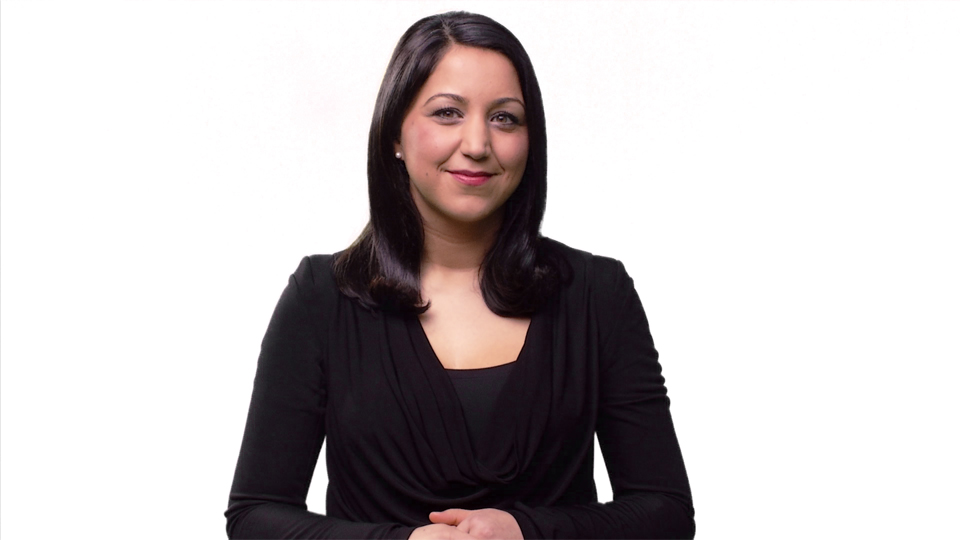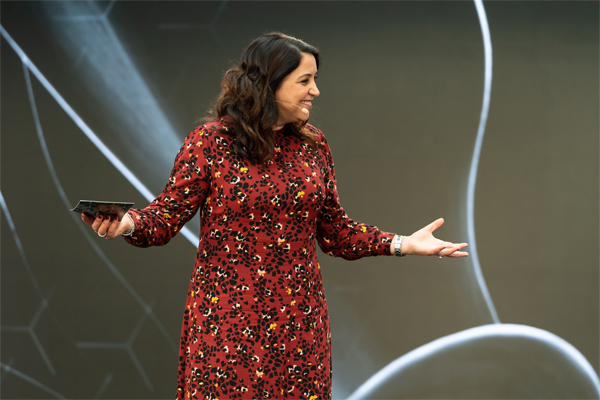Continuing our Women’s History Month and #IWD2020 series, this week we feature Accenture UK & Ireland’s Senior MD of Technology, Zahra Bahrololoumi. Accenture’s diversity and inclusion champion shares her personal journey of #gettingtoequal and the sheroes – and heroes – who have spurred her on. She also explains why she believes it’s the inclusive ‘culture makers’ that are driving change to ultimately make us all ‘boundaryless’.
Picture the scene, if you can: you’re in a small Iranian village called Shapourabad. It’s 1916. And you want to start a school. Not a school in the sense that anyone who’s experienced education in the UK or Europe, would likely recognise though. It was here that my great great grandmother, Sekineh Bahrololoumi, turned the room in the back of her house into a makeshift school for girls. It drew plenty of objection, and most people in the village wanted it to stop. But she wanted to show these young people what they could achieve.
CELEBRATING EVERYDAY SHEROES & HEROES
Fast forward 100 years and we’re seeing the progress towards gender equality stall globally. Even our recent research shows that people in the UK think it’s slowed down. Back in Shapourabad, Sekineh refused to see the impossibility of her goals. She lived at the edge of what’s possible, and that’s why she is such an inspiration. I strongly believe that we need to draw more inspiration from our everyday heroes and sheroes if we’re going to renew the impetus behind our parity goals.
I think most people at some time will have been told, or at least felt, that something is impossible. For some, it becomes a deterrent. For others it creates a greater drive to succeed. The people who believe that anything is possible are those that sent astronauts into space, crossed the oceans and pioneered new technologies. While we can’t all be Margaret Hamilton, Amelia Erhardt or Ada Lovelace, there are people around us who change the world in small ways every day.
CULTURE MAKERS
We call these everyday heroes and sheroes ‘Culture Makers’. They are more likely to be female, though not exclusively, and younger than the average executive. They exist in small numbers at the moment – 9% of female executives and 5% of male are in this category. They drive inclusion in their businesses, which as a result, grow twice as fast.
In practice what this looks like is leaders who are more in tune with employees’ expectations. It sounds simple, but requires a dedicated effort. Most businesses – 62% in fact – will say that culture matters, but it is mainly the culture makers that are making positive change their own personal goal. They make this happen by rewarding those in their teams that drive change.
I have spent a lifetime and a career not looking or being like most of the other people in the room. When I first started working, I was one of only two women in technology within an intake of nearly 50. At that time, a lot of the things that we see today felt unthinkable. Within my team in Accenture today, Ruth Ormsby, is the first and only female leader in technology sales in Accenture in the UK – and the first globally. Emma Kendrew is the first female leader of engineering services in the UK – and globally. Emma Roscow is the first female leader of infrastructure services in the UK – and globally. They ignore boundaries and push people towards better solutions – as culture makers should.

TECH VISIONARIES
At the same time, another member of my team, Yann Lepant conceived ‘Tech Visionaries’ This under-graduate recruitment programme increased the amount of women brought into technology roles in the business. One recent intake was 98% female, with 90% taking full time positions. Typical recruitment numbers – and my own personal experiences – show how rare that level of corrective action is.
Sometimes the actions we need are less formal in their nature. Culture makers are needed as a positive example, not only to show how to do things, but also to challenge assumptions and prejudices. We have an example of this kind of culture maker in Accenture. Jeremy Oates is the global COO for Accenture Technology. He interrogates recommendations or decisions to uncover any hidden discrimination. For instance, if anyone suggests that “there aren’t enough female candidates”, they’re told to “look harder”.
We all know that there are plenty of very good women out there. Sometimes they’re just harder to find. We shouldn’t just take the easy route. The same is true when it comes to promotions. Women often get overlooked and/or labelled as not ready – usually because of personality traits that actually have no bearing on their ability to do the job. If anyone is labelled ‘not ready’, we should challenge that, as well as why someone else is deemed more suitable.
FRUSTRATING SLOW PROGRESS
Whether making hires or rewarding employees, there will be cases where male candidates are more suitable. In every case, though, the best person should be selected. The challenge is that there are still a lot of workplaces where the default is to a man, which culture makers take a personal responsibility to change.
We need more people who don’t see boundaries. Or who see them, ignore them and carry on. It’s people like this that are fundamental to changing our future. But these changes are not commonplace, and these people don’t exist in every organisation. Progress towards genuine parity is frustratingly slow.
One part of the solution is formal programmes, like Tech Visionaries. Another is encouraging our leaders to behave like culture makers. To take personal responsibility for progress and reward those who are equally committed. But we can also celebrate people who have lived on the edge of what’s possible.
INSPIRING SHEROES
With that in mind, I want to finish with the story of one of my all-time sheroes, who made a career of building the unbuildable. Dame Zaha Hadid is a constant source of inspiration for me. The greatest ever architect. She was the first woman to win the Pritzker Architecture Prize (in 2004), The Stirling Prize twice and the RIBA royal gold medal. She was awarded the CBE in 2002, made a Dame in 2012 and she even had her own Google Doodle!
But it’s not the prizes that make the “Queen of the Curve” so inspirational. She shattered glass ceilings and pushed through boundaries in so many ways. She was often called the ‘paper architect’ because so many of her designs didn’t get built. Her design method tested everyone: her team, her clients, her engineers. Modern engineering often lagged years behind her, so her designs simply couldn’t be built.
She pioneered computer aided design and the idea of parametricism: that any parameter or boundary within design was malleable. She changed the rules. Eventually technology and engineering caught up. As she knew they would.
The story I began with, of my great great grandmother is one of many stories of the Bahrololoumi women that my Dad would tell me when I was younger. Culture makers in businesses are essential, but if we want a generation of people like Zaha Hadid, who live on the edge, then we also need to celebrate inspirational women in all parts of life. It’s only by people taking the time to celebrate the impossible and the ‘boundaryless’ that we can all make things better.
AUTHOR BIOGRAPHY
Zahra Bahrololoumi is the head of Technology for Accenture UK and Ireland. She believes strongly that transformative change is the product of not only deep technology expertise, but also an understanding of the value it can bring to customers, employees, partners and anyone involved in its use.
Bahrololoumi works with clients across all industries to help build an understanding of that value and a plan for achieving it. She has pioneered a number of ‘firsts’ – from convening the UK technology ecosystem at the award-winning Kaleidoscope; to patented uses of cloud technology for energy industry divestments. She was previously Accenture Technology’s Inclusion & Diversity Lead Globally and the Human Capital & Diversity lead for UK&I.
She has written on diversity for publications, including Management Today, Forbes and The Telegraph. Zahra is on the board of advisors for Mind Matters – an initiative focused on mental health for young people. She has also been recognised as Management Today’s “35 Women Under 35”, as well as finalist of Women in IT: Woman of the year.
CELEBRATING WOMEN’S HISTORY MONTH
In the first of our guest column series dedicated to Women’s History Month & IWD2020, AstraZeneca’s diversity champion Dawn Christian explored how Black women entrepreneurs in the US are changing the narrative. Click here to read more.







































